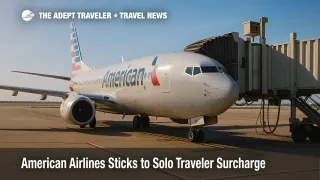American Airlines Sticks to Solo Traveler Surcharge

Major U.S. carriers were caught testing higher base fares for single-ticket buyers this spring, but only American Airlines is doubling down. New data show the airline still routinely prices one-person itineraries above identical bookings for two or more passengers, even after Delta Air Lines and United Airlines retreated amid public backlash. Consumer advocates warn the strategy quietly raises costs for business travelers and solo vacationers at a time when airlines already face scrutiny over fees. Regulators have yet to weigh in. For now, shoppers should always compare fares for different party sizes before paying.
Key Points
- Why it matters: Solo travelers on many American routes pay 5-plus percent more than duos booking the same flights.
- Delta and United rolled back the surcharge after criticism; American has not.
- Economist analysis found the gap on 57 percent of American's weekday routes versus 8 percent at United.
- Higher solo fares appear concentrated on short, non-Southwest routes.
- No public comment from American Airlines despite mounting pressure.
Snapshot
American's pricing gap surfaced in late May when Thrifty Traveler uncovered domestic one-way tickets costing up to one-third more for a single passenger than for pairs. Delta and United initially matched the pattern but updated inventory within days to level prices. The Economist's follow-up study of 6 000 weekday departures found American charging solo flyers at least five percent extra on well over half its network, especially on business-heavy shuttles under 750 miles. United showed the differential on fewer than one in ten comparable routes, and Delta currently shows none. Analysts say sophisticated revenue-management tools let airlines segment travelers by party size without formal "single supplements."
Background
Airlines have long used fare classes to manage supply, but traditional logic priced each seat identically within a cabin regardless of party size. By loading separate fare buckets that open only when two or more seats are requested, carriers can capture higher yields from corporate travelers, who frequently book single tickets on short notice. The tactic mirrors a bygone Saturday-night-stay rule once aimed at business flyers. Kyle Potter of Thrifty Traveler spotted the new twist when a $206 Delta fare fell to $154 per person after adding a second traveler. Similar examples quickly surfaced on United and American, touching off social-media outrage and coverage in mainstream outlets such as The Washington Post. Delta and United quietly equalized prices within 48 hours; American never budged.
Latest Developments
Delta and United Backtrack, Then Diverge
After initial blowback, Delta purged single-ticket surcharges entirely, stating all travelers should "see the same lowest fare." United matched the move but industry trackers noticed the carrier reinstated select differentials in July, though at far lower frequency than before. Both airlines declined comment on the reversals. Revenue analysts suggest the rapid toggling signals live A/B tests inside each carrier's revenue-management system as teams gauge elasticity without provoking regulators. For now, single-ticket shoppers on Delta enjoy parity, while United's solo penalties appear on fewer than ten percent of routes and fluctuate weekly.
Economist Data Quantifies American's Aggressive Use
The Economist combed mid-July weekday schedules and found American adding a five-percent-plus solo premium on 57 percent of analyzed routes-seven times United's share. The gap widens on legs under two hours and on city-pairs where Southwest Airlines does not compete, underscoring how lower-cost rivals constrain the practice. On flights where Southwest overlaps, American's average solo markup dropped to just two percent. Yet American's management remains silent, and internal fare-rule text still requires an accompanying adult to unlock cheaper buckets, effectively codifying a "two-seat minimum" for the best prices.
Analysis
American's stance highlights the delicate balance between revenue optimization and brand perception. By segmenting on party size, the carrier captures incremental yield from business travelers, who generally book solo, while still marketing competitive leisure pricing to couples and families. The approach assumes blowback stays within travel-blog circles rather than triggering federal scrutiny. History offers mixed lessons: post-pandemic fee hikes on seat selection drew congressional hearings, yet airlines walked away largely unscathed. However, the Department of Transportation is currently mulling broader transparency rules, and discriminatory pricing affecting a protected class-such as solo flyers with disabilities-could invite formal complaints. Competitive risk is another factor. If Delta uses its surcharge reversal as a marketing cudgel, American could face loyalty erosion among premium passengers already weary of crowded cabins and shrinking elite benefits. Meanwhile, technology makes the practice easier to detect: shoppers can toggle passenger counts in Google Flights or ITA Matrix, instantly exposing discrepancies that once hid in legacy GDS screens. As consumer awareness grows, pressure to normalize fares across party sizes will intensify, potentially nudging regulators or prompting class-action litigation alleging unfair or deceptive practices. Until then, the onus remains on travelers to outsmart airline algorithms.
Final Thoughts
American Airlines is betting that silent persistence will outlast the news cycle, but the solo traveler surcharge is now public knowledge. With rivals tempering or abandoning the tactic, continued differentials risk regulatory heat and customer defection. Travelers should keep comparing fares by passenger count-and, when feasible, book in pairs-to avoid paying the American Airlines solo traveler surcharge.
Sources
- American Airlines Refuses to Change Policy Despite Outrage - Men's Journal
- Airlines' Favourite New Pricing Trick - The Economist
- US Airlines Are Quietly Hitting Solo & Biz Travelers with Higher Fares - Thrifty Traveler
- After Blowback, Delta & United Dump Fares That Punish Solo Travelers - Thrifty Traveler
- Flight Deal Experts Spot a Surprise Upcharge: Flying Solo - The Washington Post
